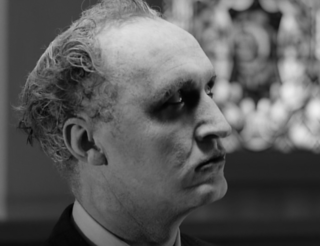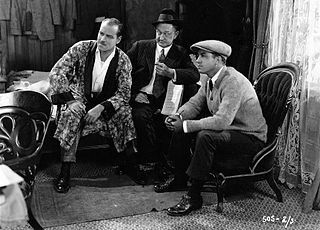Related Research Articles

Harold Arnold "Herk" Harvey was an American film director, screenwriter, actor and film producer, perhaps best known for his 1962 horror film Carnival of Souls.
The Prelinger Archives is a collection of films relating to U.S. cultural history, the evolution of the American landscape, everyday life, and social history. It was in New York City from 1982 to 2002 and is now in San Francisco.

Rick Prelinger is an American archivist, writer, and filmmaker. A professor at the University of California, Santa Cruz, Prelinger is best known as the founder of the Prelinger Archives, a collection of 60,000 advertising, educational, industrial, and amateur films acquired by the Library of Congress in 2002 after 20 years' operation.
Shelby William Storck was an American newscaster, actor, writer, journalist, public relations specialist, and motion picture and television producer-director. He was a radio actor on The Air Adventures of Jimmie Allen and other programs, and appeared in the feature films The Delinquents and The Cool and the Crazy.

Centron Corporation was a leading industrial and educational film production company, specializing in classroom and corporate 16mm films and VHS videocassettes. A slightly smaller company than its contemporaries such as Encyclopædia Britannica Films, Coronet Films and Learning Corporation of America, it was very successful from the late 1940s through the early 1990s, gaining added fame with the Academy Award-nominated Leo Beuerman in 1969.

Charles Edgar Schoenbaum A. S. C. was an American cinematographer. His known film credits began in 1917—although he probably had earlier films—and ended with his untimely death from cancer in 1951 at age 57. He was nominated for an Academy Award in 1949 for his work on Little Women.
Does It End Right? is a 1914 American silent short drama film directed by Sydney Ayres. It stars William Garwood, Charlotte Burton, Louise Lester, Vivian Rich, Jack Richardson and Harry von Meter.

Coronet Films was an American producer and distributor of documentary shorts shown in public schools, mostly in the 16mm format, from the 1940s through the 1980s. The company, whose library is owned and distributed by the Phoenix Learning Group, Inc., covered a wide range of subjects in zoology, science, geography, history and math, but is mostly remembered today for its post-World War II social-guidance films featuring topics such as dating, family life, courtesy and citizenship.
An orphan film photos is a motion picture work that has been abandoned by its owner or copyright holder. The term can also sometimes refer to any film that has suffered neglect.

Loose Ankles is a 1930 pre-Code romantic comedy with songs, produced and released by First National Pictures, which had become a subsidiary of Warner Bros. The film was directed by Ted Wilde and stars Loretta Young, Douglas Fairbanks, Jr., Louise Fazenda and Edward Nugent. It was a remake of the 1926 silent film titled Ladies at Play, which had been produced by First National Pictures. Both versions were adapted by Gene Towne from the 1926 play Loose Ankles by Sam Janney. Sam Janney was to direct the film but died in a car crash during production.

Conspiracy is a 1930 American pre-Code mystery melodrama film produced and distributed by RKO Pictures and directed by Christy Cabanne. It is the second adaptation of the play The Conspiracy by Robert B. Baker and John Emerson and stars Bessie Love and Ned Sparks.
André de la Varre was a leading American travelogue filmmaker from a prominent family who started as a 17-year-old visiting Europe with a recently acquired movie camera at the end of World War I. Born Franklin LaVarre, he was the brother of noted Westerns actor John Merton, the journalist/explorer William LaVarre, and the international businessman Claude LaVarre.
Kalem Co. v. Harper Bros., 222 U.S. 55 (1911), was a United States Supreme Court case in which the Court held producing a motion picture based on a dramatic work can be copyright infringement. The producer of the motion picture is liable even they are not the exhibitor. This does not extend to a restriction of the dramatic work's ideas; it is a recognition of the author's monopoly powers granted by Congress.
Margaret Darrell was an American film editor active during the late 1920s at DeMille Pictures.
Dorothy Rockfort, born Mildred Dorothy Rochfort, was a screenwriter who worked in Hollywood during the silent era. She primarily worked on short Westerns and serials. She was married to fellow screenwriter William Pigott, who later got involved in real estate after leaving the business.
Margaret Ann (“Peg”) Shelley Vance was an American composer and music educator who is best remembered today for her compositions and arrangements for choirs.
Erica Anderson (1914–1976) was an American film director, writer, and cinematographer. She was among the first women working as a professional cameraperson in documentary and industrial films. Two documentary films on which she served a cinematographer received Academy Award nominations for Best Short Subject (Two-Reel) in 1951, Grandma Moses, and Best Documentary Feature in 1958, which it won, Albert Schweitzer.
Margaret Lee Burgess Dick was an American film producer and director of independent documentary and industrial films. She was one of the first women to work in the industry and may have been the first American woman with solo directing credits on a documentary film for The School in 1939.
Rosemarie Hickson was one of the first American women film editors and directors of documentary, educational, and industrial films.
References
- ↑ "Margaret Carlile 'Trudy' Travis". LJWorld.com. Retrieved 2024-01-21.
- ↑ Faye E. Riley, "Centron:, an Industrial/Educational Film Studio, 1947-1981," Films that Work: Industrial Film and the Productivity of Media, ed Vincenz Hediger & Patrick Vonderau. Amsterdam University Press: Amsterdam, 2009.
- ↑ Hediger, Vinzenz; Vonderau, Patrick (2009). Films that Work: Industrial Film and the Productivity of Media. Amsterdam University Press. ISBN 978-90-8964-013-0.
- ↑ Smith, Ken (1999). Mental hygiene: classroom films 1945-1970. New York: Blast Books. ISBN 978-0-922233-21-2.
- ↑ Cecil B. deMille turns actor to bring Kansas voters a "Showdown" Dn the Right tn Work, Business Screen Magazine 4(19), 1958, p.43.
- ↑ The Case for Drqanized Medicine: A Convincing Exposition of Its Contributions to Medical Progress Is Made by the AMA Through a "Doubting Doctor," Business Screen Magazine 4(18), 1957, p.34
- ↑ Sales-Maker in the Farm Market: "The Last of Grass" a Sequel in Monsanto Program, Bsuiness Screen Magazine, 3(18), 1957, p. 52.
- ↑ "Let's Try Choral Reading," review by Betty Weiser, EdScreen & AV Guide, July, 1957, p.379.
- ↑ Office, Library of Congress Copyright (1955). Catalog of Copyright Entries: Third series. p. 266.
- ↑ Library of Congress, Copyright Office (1960). Motion Pictures 1950 to 1959. Prelinger Library. p. 381.
- ↑ Library of Congress, Copyright Office (1960). Motion Pictures 1950 to 1959. Prelinger Library. p. 386.
- ↑ Library of Congress, Copyright Office (1960). Motion Pictures 1950 to 1959. Prelinger Library. p. 141.
- ↑ Library of Congress, Copyright Office (1960). Motion Pictures 1950 to 1959. Prelinger Library. p. 312.
- ↑ Office, Library of Congress Copyright (1951). Catalog of Copyright Entries: Third series. p. 117.